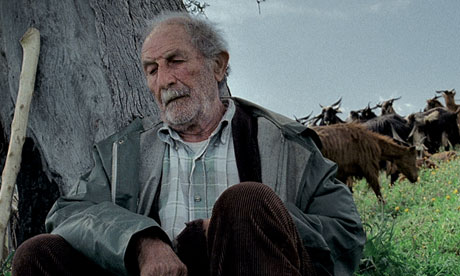Le Quattro Volte – review
Milanese artist-turned-director Michelangelo Frammartino returns with his second cinematic feature, Le Quattro Volte, a slow-paced naturalistic film about the quaint lives of a community in the hilly Calabria region of southern Italy.
The film has been widely lauded as life-affirming and inspirational filmmaking and it landed several European film awards in advance of its release. Frammartino has translated his art and photography into cinema, with a piece driven by symbolism and a meticulous dedication to aestheticism.
The title is the theme of the film, as Le Quattro Volte – translated as ‘The Four Times’ – is a reference to the indivisibility of minerals, vegetables, animals and humans; a notion deriving from Greek philosopher and mathematician Pythagoras.
The film begins by walking the viewer through the painstaking daily routine of an old goatherd, who is close to death’s door. There is virtually no dialogue or music and instead we experience the heartbeat of nature along the film’s journey; hearing just the goat bells; the trudging footsteps; the barking of the goatherd’s dog and the man’s incessant coughing.
Some shots are delivered with prolonged perfectionism and others like a nature programme’s voyeurism. With visual storytelling, the viewer is shown nature’s life cycle – in the form of the idea of a square of indivisibility – and in Le Quattro Volte this cycle includes the death of the goatherd, the birth of a new batch of goats, the cutting down of an abundant tree and the production of charcoal.
The perspective of the film drives the idea of reincarnation and the transmigration of the soul – a concept that Pythagoras was interested in – as though the soul of the goatherd transports to that of a new goat kid, which finds solace by a fir tree (the soul’s new host) and eventually the tree is chopped down, utilised and manipulated to produce the mineral charcoal, where the soul finally resides before becoming dust.
There is no doubting the beauty of the cinematography and the intrigue of neutralising these four aspects of nature, while interspersing religious imagery to suggest the presence of the spirit amidst nature, but you need the patience of a saint to fully enjoy Le Quattro Volte.
There are intentional moments of quirky humour to lighten the slow-paced action. There is a farce with a dog that sees a truck crash into a goat pen while a Good Friday procession is in progress, as the dog torments a boy and there is hilarity in the goatherd running around clutching a bell, while in desperate pursuit of his usual dose of “holy” dust from the church – which he puts into his daily pre-sleep drink – like a drug-user in need of a hit. With the goat pen having been breached, the goats run amok to comic effect and there is surreal imagery including a goat standing atop a kitchen table.
However, these mildly amusing moments are not satisfying enough to compensate for a laborious build up that is slow to the point of irritation. Potent art should provoke sensations and thought. In addition to this, artful cinema should still entertain and engage. In the hour and a half we are granted for our entrance fee, we should expect to be given more of a reward than Le Quattro Volte offers.
The most entertaining scene in film shows the new goat kids playing and trying to assume dominance; a delight that could be witnessed at a local field or farm rather than a cinema. Sadly, the tedium of the action outweighs the pay-off of the imagery and metaphysical concepts.
Le Quattro Volte (U)
Directed by Michelangelo Frammartino
Starring: Giuseppe Fuda, Bruno Timpano, Nazareno Timpano
Running time: 88 minutes
Le Quattro Volte is showing at the Rio Cinema until 2 June.

